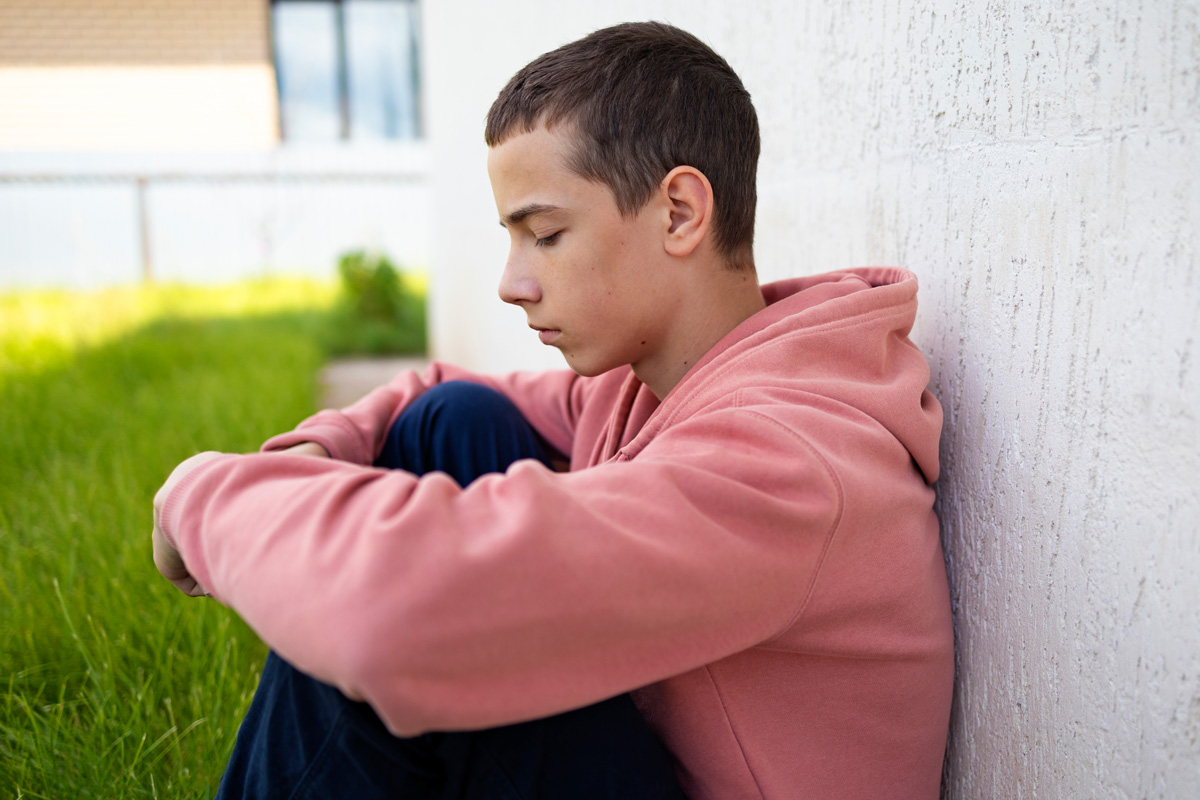It’s not unusual to feel sad or discouraged about life every once in a while. That’s something a lot of teens go through when they have a setback at school or a problem with friends. Yet, depression is different, and it’s more than just sadness or a rough day. Depression can be sadness that lasts for weeks at a time and lingers, even when something positive happens. Regrettably, an increasing number of teens are grappling with depression. In 2009, 8% of teens aged 12 to 17 reported feeling depressed, a figure that nearly doubled to 15.8% in 2019 (Daly, 2022).
In addition to sadness, depression can also be an irritable mood or hopelessness about the future that is hard to shake. It may lead to a loss of interest in activities once enjoyed or a noticeable lack of motivation for school-related tasks. Parents may notice a teen sleeping more or less than usual or waking up often at night. Other indicators include a notable decrease in energy levels or unexplained weight changes. Parents may notice their teen saying a lot of negative things about themselves or the future. An important thing for parents to realize is depression is more than just one thing; and it’s something that can happen to anyone, even if they have a lot of friends, a wonderful family, or a bright future.
If you’re concerned about your teen’s mental health, Therapy for Teens in Arlington, MA at The Bain Health and Wellness Center can provide the support and guidance needed. Our specialized approach to therapy for teens can help address the underlying issues contributing to depression and provide tools to cope and heal.

How Parents Can Support Their Teen

The good news is that depression is something teens can overcome. Parents can support their teens by listening to their concerns and encouraging them to talk about their feelings. When teens talk about being depressed, parents can do wonders by being open-minded. It can be hard to know why a teen is feeling depressed, but a non-judgmental and compassionate stance can make it easier for a teen to open up. It’s also important to let teens know that anyone can be depressed, and depression doesn’t mean there’s something wrong with you. Doing things together, like going for a walk or dinner, can also help depressed mood and let teens know they are not alone.
Sometimes, though, listening is not enough, and teens need support from a therapist who has expertise in treating depression. This is especially true if depression is causing problems with functioning, such as getting low grades, social isolation, or dropping out of activities. Parents should absolutely get support if teens talk about hurting themselves, discuss suicide, or do something to harm themselves. Although there is sometimes a wait for a qualified therapist to have an opening, there are services that provide immediate support if a teen is doing something unsafe or thinking about hurting themselves. In addition to going to a hospital emergency room for help, parents and teens can utilize crisis hotlines, such as texting 988. The Massachusetts state government also compiled a list of other potential supports for urgent situations that can be found here: https://www.mass.gov/info-details/crisis-hotlines.
Treatment for Teens with Depression

Therapy for depression can provide teenagers with strategies to cope with sadness, irritability, or hopelessness and help them recognize how depression affects them. It can also help them to identify thoughts that are unhelpful and approach situations in healthier, more adaptive ways by trying out different behaviors. It can also help them explore their attitudes about school or relationships and how they impact their depressed mood. Cognitive behavioral approaches to depression (also called Cognitive Behavioral Therapy) are often utilized and have a strong reputation as an effective intervention (Spirito et al., 2011.)
In some cases, treatment for depression may also include medication to help with cognitive, affective, and physical symptoms. These medications target specific chemicals in the brain associated with the symptoms of depression. Not every teen who is feeling depressed will need to take medication, and many people get better without it. This is something a primary care doctor and a qualified therapist can discuss with parents and teens. Research has shown that cognitive behavioral therapy can be the best choice for mild and moderate forms of depression. Parents might not know how severe the teen’s depression is, but a primary care doctor or therapist will assess the situation to determine the most appropriate treatment approach.
How to Help Your Teens with Depression through Therapy for Teens in Arlington, MA
Depression can feel overwhelming, and teens and parents may find themselves uncertain about how to cope. Parents and teens do not have to face those challenges alone. Support is available, and there are approaches to therapy that can help. Collaborating with a therapist provides teens with the guidance and tools necessary to navigate through their struggles, ultimately enabling them to rediscover joy and fulfillment in their lives. If you’re seeking support, Therapy for Teens in Arlington, MA at The Bain Health and Wellness Center offers specialized approaches tailored to the unique needs of teenagers, providing a safe space to explore and address the root causes of depression. Follow the steps below to begin helping your teens with depression:
- Reach out today to begin your free 20-minute consultation.
- Speak with a compassionate teen therapist.
- Help your teen with depression live a happier life!
Other Therapy Services Offered at The Bain Health and Wellness Center in Arlington, MA, and Throughout Massachusetts
If you believe your teen shows signs of depression and could benefit from mental health treatment, reach out to the Bain Health and Wellness Center (BainHWC). We offer in-person and virtual therapy for teens experiencing depression, anxiety, ADHD, autism, trauma, OCD, and more. All mental health therapists at BainHWC are trained in evidence-based treatment, such as Cognitive Behavioral Therapy, and have several years of experience working with children, teens, and young adults.
Reference
Daly M. (2022). Prevalence of Depression Among Adolescents in the U.S. From 2009 to 2019: Analysis of Trends by Sex, Race/Ethnicity, and Income. The Journal of adolescent health: official publication of the Society for Adolescent Medicine, 70(3), 496–499. https://doi.org/10.1016/j.jadohealth.2021.08.026
Spirito, A., Esposito-Smythers, C., Wolff, J., & Uhl, K. (2011). Cognitive-behavioral therapy for adolescent depression and suicidality. Child and Adolescent Psychiatric Clinics of North America, 20(2), 191–204. https://doi.org/10.1016/j.chc.2011.01.012






